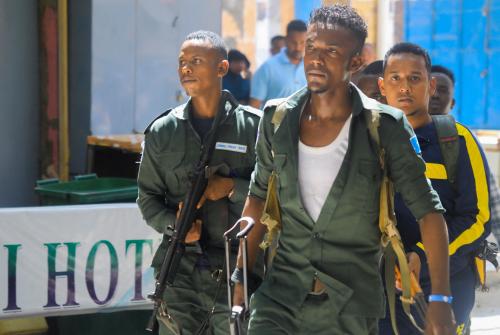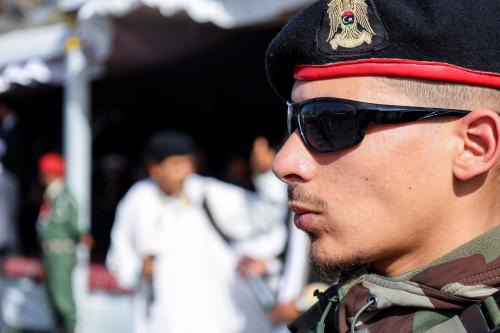
Editor’s Note: The blog posts in this series are adapted versions of speakers’ opening remarks from the June 24th Brookings Debate, which asked: “Should the U.S. put boots on the ground to fight ISIS?”
There are two basic reasons why large U.S. ground forces are a bad idea in the fight against Islamic State (or ISIS):
First, they are not necessary.
Second, they won’t work, and will even be counterproductive.
Not necessary
ISIS has demonstrated great tactical and operational proficiency, but it is not ten-feet tall. They have many weaknesses.
Foremost among them is that everyone hates them—the West hates them, the Kurds hate them, the Iranians hate them, the Sunni powers hate them, and recently anyone governed by them hates them. Even al-Qaida hates them. This is an impressive list of enemies even by Middle Eastern standards.
And it helps explain why ISIS has demonstrated no capacity to expand beyond Sunni Arab areas. They are hopelessly outnumbered by their Shiite and Kurdish enemies, and facing a restive and angry Sunni population to govern.
These enemies, in combination with coalition airpower, mean ISIS’ expansion is already effectively limited to the Sunni Arab areas of Iraq and Syria. They are stuck in a war of attrition they cannot hope to win, even if they can hold on for a very long time.
In the meantime, they are not capable or really interested in attacks on the United States, despite much heated rhetoric to the contrary. Since 9/11, we have become extremely effective at preventing terrorist attacks that emanate from abroad, despite the endless predictions of such attacks. Our homeland security system, in short, is working and we should appreciate the cushion of security that gives us.
ISIS ideology could perhaps inspire individuals within the United States. And let’s face it, as the events in Charleston demonstrate, we have a huge problem with isolated, angry young men, inspired by whatever ideology, resorting to violence and terrorism.
A recent FBI report documented 160 mass shootings over 13 years resulting in nearly 500 deaths. None had any operational connection abroad. Only two, both lone wolves, were inspired by foreign Islamist ideology.
So ISIS could disappear tomorrow, or take Baghdad tomorrow, and it wouldn’t appreciably change this problem. We should do something about this violence but invading Iraq or Syria isn’t it.
Not effective
The second point is that U.S. ground forces will not solve the problem that ISIS represents.
All agree that ISIS is a symptom of the political and sectarian struggles in Iraq and Syria. U.S. ground troops can likely inflict military defeats on ISIS, but to what purpose?
Let’s recall that the United States just spent nine years occupying Iraq with ground forces, fruitlessly trying to create an inclusive political order in Baghdad and in the process spawning ISIS from U.S. military prisons. Without progress by local actors on the political front, defeating ISIS militarily will mean nothing. Another, perhaps worse, group will simply arise.
Of course, various people in Washington will tell you that we now understand the mistakes of the past,
- that we now know how to create an inclusive political order in Iraq and Syria;
- that the problem was the stupidity of the Bush or Obama administrations;
- that all we have to do is support this politician or arm this militia;
- and that now, after more than a decade of trying and more than $25 billion in taxpayer money, we know how to train effective Iraqi Security Forces that won’t crumble or Syrian opposition forces that won’t betray us.
Well, buyer beware. This is not just a question of political will or strategy. The record of U.S. efforts at political engineering in the Middle East is quite dismal.
In this case, the fundamental problem is that, beside the Kurds, we lack effective allies in both Iraq and Syria and we cannot re-build these states by ourselves.
We have to acknowledge that the United States does not come to these countries without baggage. The United States has a long and troubled history with the region. We have invaded or occupied or bombed 12 Islamic countries in the broader region since 1980 with precious little good will to show for it.
And while some regional politicians may act like allies when they want U.S. help, probably the only thing that unites nearly the entire Iraqi and Syrian political spectrum is a dislike and distrust of the United States.
Listen to the views of our most recent hope for an effective ally in Iraq—Prime Minister Haider al-Abadi—whom the U.S. helped put into power last year, on the question of U.S. ground troops: “We don’t want them. We won’t allow them. Full Stop.” To another outlet, he added: “Any foreign ground troops on Iraqi soil will be treated as enemy troops.”
That’s our putative ally. Our enemies, and they are legion in Iraq and Syria, will probably be even less hospitable.
The inevitable collateral damage coming from U.S. forces is unlikely to improve their view and may increase the desire to commit terrorism against the United States as it has often done in the past. We would likely, as that great sage Donald Rumsfeld once put it, be creating more terrorists than we killed.
Given all of this, it is unclear why the burden of dealing with ISIS should or needs to fall to the United States. Remember, ground forces are not remotely free—it cost more about $1.3 million per year to keep a U.S. combat soldier in Iraq, not to mention the risk to that soldier’s life, limbs, and mental health.
So, in short, U.S. ground forces are not necessary to deal with the problem of ISIS, they are not capable of dealing with the problem that ISIS represents, and might make the problem worse.



Commentary
U.S. boots on the ground against ISIS: Neither necessary nor effective
July 6, 2015